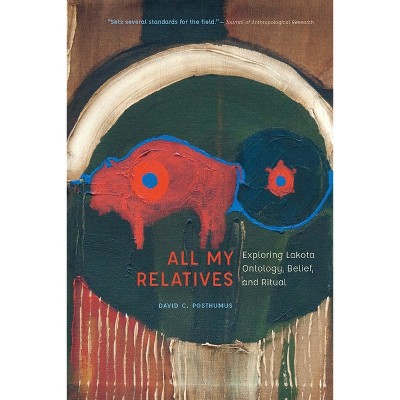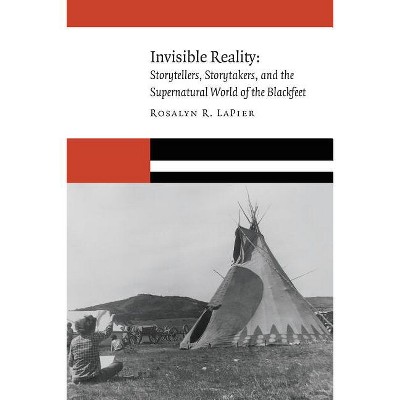Sponsored

Blood Will Tell - (New Visions in Native American and Indigenous Studies) by Katherine Ellinghaus (Paperback)
$23.99Save $1.01 (4% off)
In Stock
Eligible for registries and wish lists
Sponsored
About this item
Highlights
- Blood Will Tell reveals the underlying centrality of blood in shaping official ideas about who was eligible to be defined as Indian by the General Allotment Act in the United States.
- About the Author: Katherine Ellinghaus is an associate professor of history at La Trobe University in Melbourne.
- 234 Pages
- Social Science, Ethnic Studies
- Series Name: New Visions in Native American and Indigenous Studies
Description
About the Book
A study of the role blood quantum played in the assimilation period between 1887 and 1934 in the United States.Book Synopsis
Blood Will Tell reveals the underlying centrality of blood in shaping official ideas about who was eligible to be defined as Indian by the General Allotment Act in the United States. Katherine Ellinghaus traces the idea of blood quantum and how the concept came to dominate Native identity and national status between 1887 and 1934 and how related exclusionary policies functioned to dispossess Native people of their land. The U.S. government's unspoken assumption at the time was that Natives of mixed descent were undeserving of tribal status and benefits, notwithstanding that these people played crucial roles in the national implementation of allotment policy. Ellinghaus explores on-the-ground case studies of Anishinaabeg, Arapahos, Cherokees, Eastern Cherokees, Cheyennes, Chickasaws, Choctaws, Creeks, Lakotas, Lumbees, Ojibwes, Seminoles, and Virginia tribes. Documented in these cases, the history of blood quantum as a policy reveals assimilation's implications and legacy. The role of blood quantum is integral to understanding how Native Americans came to be one of the most disadvantaged groups in the United States, and it remains a significant part of present-day debates about Indian identity and tribal membership. Blood Will Tell is an important and timely contribution to current political and scholarly debates.Review Quotes
"Katherine Ellinghaus brilliantly traces the uneven practices that produced a powerful discourse of American Indian blood quantum. With sure hand and subtle interpretation, Blood Will Tell offers a compelling new reading of a technology of identity at once complicated and crude."--Philip J. Deloria, Carroll Smith-Rosenberg Collegiate Professor at the University of Michigan, Ann Arbor, and author of Indians in Unexpected Places-- (9/10/2016 12:00:00 AM)
"Ellinghaus has taken a nuanced approach to an incredibly complex and wide-ranging topic with successful results. The book is thoroughly researched, well argued, and will be especially useful to scholars of nineteenth-century American Indian history and federal Indian policy."--Natalie Panther, Chronicles of Oklahoma
"Blood Will Tell engages with and makes important contributions to the historical scholarship and contemporary political debates on race and citizenship in the academy, as well as in American Indian families, communities, and nations."--Jill Doerfler, American Historical Review
"Blood Will Tell is a valuable contribution to studies of the allotment era in particular and to studies of U.S.-American Indian relations and settler colonialism in general."--John R. Gram, Southwestern Historical Quarterly
"Blood Will Tell makes a brilliant and original contribution to historical scholarship on Indians, race, and settler colonialism in western American history and merits a wide readership."--Baligh Ben Taleb, Pacific Historical Review
"Ellinghaus offers this book as a means for critiquing and analyzing the phenomenon of settler colonialism which allowed for tropes of authenticity to persist to today. It also adds to the story of Native Americans' unrelenting resistance with racial science and white structures. In light of the semi-recent events at Standing Rock, Native American persistence throughout history is again highlighted by their ability to resist and act against their oppressors."--Hannah Blubaugh, Origins
"Ellinghaus utilizes an impressive amount of archival research and specific case studies to show how the concept of blood permeated the policies of the Office of Indian Affairs during [the late nineteenth and early twentieth century]."--Paul Spruhan, Canadian Journal of Native Studies
"Ellinghaus's work shines a light on a crucial component of federal Indian policy."--Christopher Steinke, Nebraska History
"This book makes a significant contribution to how we interpret assumptions about ethnicity, skin color, and cultural behavior--from low-level civil servants to official ideology to indigenous notions of identity. It is a welcome addition to furthering our understanding of blood quantum and Native American policy."--Ryan W. Schmidt, Great Plains Quarterly
"Written with great clarity and precision. . . . Ellinghaus develops several key insights that will make contributions to historical scholarship on Indians, race, and western American history."--Margaret Jacobs, Chancellor's Professor of History at the University of Nebraska-Lincoln and author of A Generation Removed: The Fostering and Adoption of Indigenous Children in the Postwar World -- (9/10/2016 12:00:00 AM)
About the Author
Katherine Ellinghaus is an associate professor of history at La Trobe University in Melbourne. She is the author of Taking Assimilation to Heart: Marriages of White Women and Indigenous Men in Australia and the United States, 1887-1937 (Nebraska, 2006) and coeditor of Historicising Whiteness: Transnational Perspectives on the Construction of an Identity.Dimensions (Overall): 8.9 Inches (H) x 5.9 Inches (W) x .51 Inches (D)
Weight: .78 Pounds
Suggested Age: 22 Years and Up
Number of Pages: 234
Genre: Social Science
Sub-Genre: Ethnic Studies
Series Title: New Visions in Native American and Indigenous Studies
Publisher: University of Nebraska Press
Theme: Native American Studies
Format: Paperback
Author: Katherine Ellinghaus
Language: English
Street Date: May 1, 2022
TCIN: 1001558334
UPC: 9781496230379
Item Number (DPCI): 247-27-0120
Origin: Made in the USA or Imported
If the item details aren’t accurate or complete, we want to know about it.
Shipping details
Estimated ship dimensions: 0.51 inches length x 5.9 inches width x 8.9 inches height
Estimated ship weight: 0.78 pounds
We regret that this item cannot be shipped to PO Boxes.
This item cannot be shipped to the following locations: American Samoa (see also separate entry under AS), Guam (see also separate entry under GU), Northern Mariana Islands, Puerto Rico (see also separate entry under PR), United States Minor Outlying Islands, Virgin Islands, U.S., APO/FPO
Return details
This item can be returned to any Target store or Target.com.
This item must be returned within 90 days of the date it was purchased in store, shipped, delivered by a Shipt shopper, or made ready for pickup.
See the return policy for complete information.












